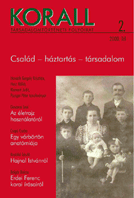ól fiú(k)ra. Örökösödési jogszokások és gyakorlat Zsámbékon a 19. század első felében
From Father to Son(s). Unwritten Laws and Practice of Inheritance in Zsámbék in the First Half of the Nineteenth Century
Author(s): Ildikó HuszSubject(s): History
Published by: KORALL Társadalomtörténeti Egyesület
Keywords: Hungary; social history; 19th century; family; Zsámbék; customary law; succession; testament; generation; social status; law; allotment; serf; cottar; marriage
Summary/Abstract: The study focuses on the customary laws related to serf inheritance in Hungary and on the practice developing along these laws in the first half of the nineteenth century. By means of an example of a German-Hungarian settlement, the study illustrates how practices of inheritance and entirely different customary laws, i.e. a German custom of impartible inheritance and a Hungarian custom of partible inheritance, finally converged. Employing contemporary family histories, the author demonstrates how the system of the property transmission between generations of local Hungarian serfs had been modified and how certain elements of impartible inheritance appeared in practice. Due to both demographic and accidental factors, this process took place in each family in a distinct pace. Consequently, it is far from obvious whether a new, uniform order of inheritance resembling the German impartible system was finally established.
Journal: Korall - Társadalomtörténeti folyóirat
- Issue Year: 2000
- Issue No: 2
- Page Range: 5-22
- Page Count: 18
- Language: Hungarian

